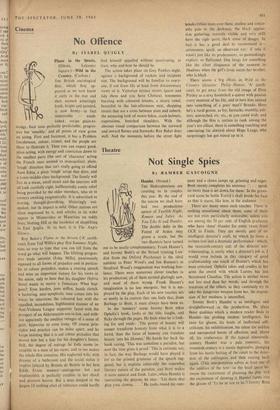Cinema
No Offence
By ISABEL QUIGLY Flame in the Streets.
(Odeon, Leicester Square.)—Wild in the Country. (Carlton.) THE British sociological film, which first ap- peared as we now know it early in the war and then seemed amazingly fresh. bright and pointed, is now firmly—in fact immovably — estab- lished: recipe plain-to- stodgy, final taste perfectly predictable; progres- sive but `sensible,' and all points of view given an airing. First and foremost, it has a Problem (intolerance, colour, crime), and the people are there to illustrate it. Then you can expect good, plain acting, with energy and conviction down to the smallest parts (the sort of 'character' acting the French once seemed to monopolise); plain, `tough' direction that isn't really going to offend Aunt Edna, a plain 'tough' script that ditto, and a lower-middle-class background. The family will live in a mean, small street and the interiors will all look carefully right, halfheartedly comic relief being provided by the older members, who sit in corners smoking enigmatically. It is advertised as searing, thought-provoking, blisteringly out- spoken; but its impact is mild. Other nations are often impressed by it, and articles in its wake appear in Montevideo or Mauritius on teddy boys, Notting Hill or the incidence of shoplifting in East 4nglia. At its best, it is The Angry Silence.
Roy Baker's Flame in the Streets (`A' certifi- cate), from Ted Willis's play Hot Summer Night, runs-so true to type that you can tell from the word go what will happen. The lifelong progres- sive trade unionist (John Mills), passionately opposed to all forms of prejudice and in particu- lar to colour prejudice, makes a rousing speech and wins an important victory for his views in the union, only to hear that his daughter (Sylvia Sims) wants to marry a Jamaican. What hap- pens? Eyes harden, jaws stiffen, hands clench, a hectoring, near-apoplectic tone comes into his voice; he interviews the coloured boy with the -appalled, incredulous, highhanded manner of an Anti-Violence League supporter faced with the prospect of an Aldermaston son-in-law, and with- out apparently the smallest twinges of a sense of guilt, hypocrisy or even irony. Of course prin- ciples and practice can be miles apart; and he keeps insisting that it is not colour prejudice that moves him but a fear for his daughter's future.
Still, the degree of outrage he feels seems in- credible in a man of his views, and to me makes the whole film nonsense. His neglected wife, with dreams of a bathroom and the social status it implies (played by Brenda de Banzie in her best Edith Evans manner—outrageous but not implausible), is perfectly credible in her shock and prurient horror. Bad a man steeped in the jargon (if nothing else) of tolerance could hardly find himself appalled without questioning, at least, why and how he should be.
The action takes place on Guy Fawkes night, against a background of rockets and incipient riot. The background will be familiar to every- one, if not from life at least from documentary views of it. Victorian terrace streets (paint and tidy them and you have Chelsea), tenements bursting with coloured tenants, a sleazy canal, beautiful in the late-afternoon mist, shopping streets that are a cross between slum and suburb, the menacing look of motor-bikes, crash-helmets, expressions, hunched shoulders. With the obvious visual comparison between the outward and inward flames and fireworks Roy Baker does well. And the moments before the street fight breaks (white louts over there, restless and notice- ably pale in the darkness: the black opposi- tion gathering, scarcely visible and very still) have the right quiet, thick sense of danger. In fact it has a good deal to recommend it— seriousness, spirit, an observant eye: if only it wasn't just like its predecessors, so painstakingly explicit, so flatfooted. One longs for something like the silent eloquence of the moment in Shadows when the girl's lover meets her brother, who is black.
There seems a b;g effort, in Wild in the Country (director: Philip Dunne; 'A' certifi- cate), to get away from the old image of Elvis Presley as a sexy bombshell a-quiver with passion every moment of his life, and to turn him instead into something of a poor man's Brando. Here he's a rural genius, as fey, farouche, mumbly, soli- tary, untouched, etc. etc., as you could wish; and although the film is certain to rank among the year's ten silliest, there is something touching and convincing (as always) about Hope Lange, who surprisingly has got mixed up in it.


































 Previous page
Previous page